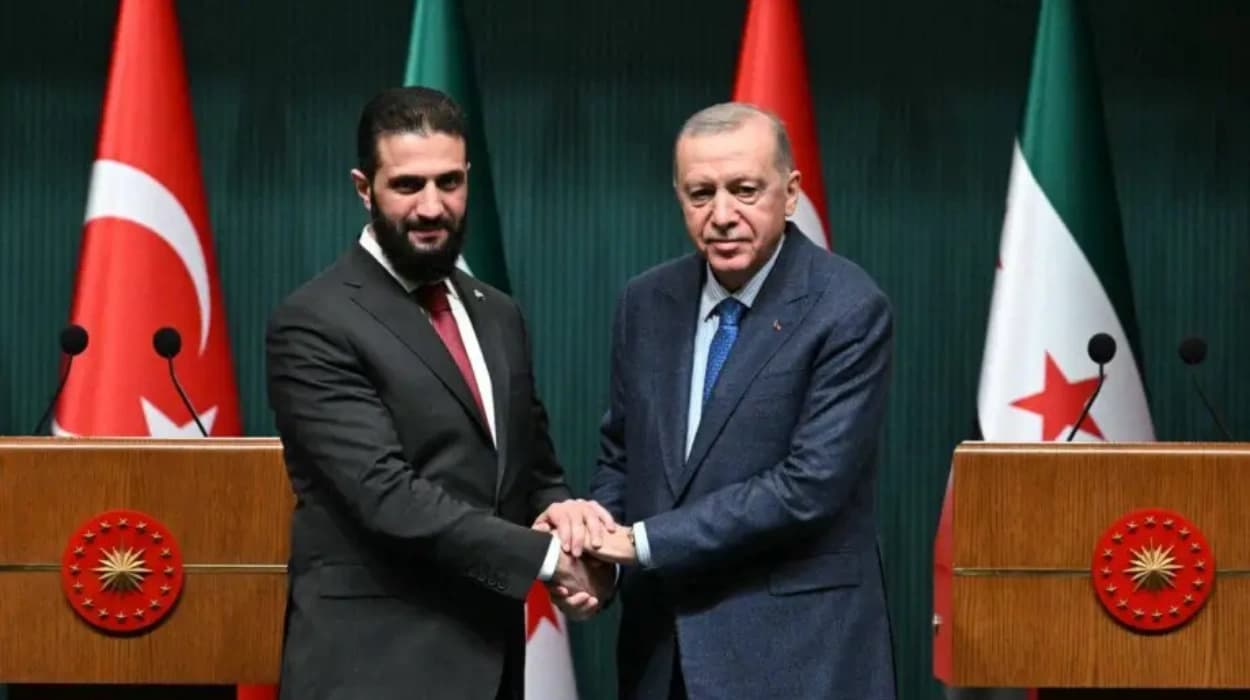President Recep Tayyip Erdogan has called on Syrian Kurds, specifically the Syrian Democratic Forces (SDF), to complete their integration with Syria's new government following a comprehensive ceasefire agreement. Erdogan emphasised the non-negotiable nature of Syria’s territorial integrity and expressed support for Syria’s new rulers led by President Ahmed al-Sharaa.
Erdogan's Call for Kurdish Integration
President Recep Tayyip Erdogan urged the Syrian Kurds, especially the Syrian Democratic Forces (SDF), to "complete their integration with Syria’s new government" after the announcement of a comprehensive ceasefire between Damascus and Kurdish forces. Erdogan made these remarks to Turkish journalists aboard a plane returning from Azerbaijan, as reported by multiple media outlets including Arab News and Turkish Minute.Erdogan stated, as reported by Arab News,
“The Syrian Democratic Forces (SDF) must keep their word. They must complete their integration with Syria.”
He further underscored that Syria’s territorial
integrity is “non-negotiable for us” and Turkey cannot accept any stance
against this principle.
The Ceasefire and Political Context
The ceasefire followed a meeting between Syrian President
Ahmed al-Sharaa and Kurdish leader Mazloum Abdi in Aleppo after deadly clashes
in the northern city. Syria’s new authorities, who came to power last year
after overthrowing Bashar al-Assad, have rejected Kurdish demands for a
decentralised government. This rejection has deepened tensions between Damascus
and the Kurdish administration controlling significant parts of northern and
northeastern Syria.
As reported by Turkish Minute and Arab News, the ceasefire
agreement comes amid stalled progress in implementing a March 10 deal aimed at
integrating the Kurds' civil and military institutions into the Syrian state apparatus.
Erdogan’s government, which supports Sharaa’s administration, insists on full
integration under Syria’s national government framework.
Historical Tensions Between Turkey and Kurds in Syria
Turkey's complicated relationship with Syrian Kurds is marked
by military operations: between 2016 and 2019, Ankara launched three offensives
against Kurdish-led groups in northern Syria, particularly targeting the YPG,
the backbone of the SDF, which Turkey associates with the PKK (Kurdistan
Workers' Party), designated a terrorist organisation by Ankara.
Erdogan’s recent statements highlight Turkey’s position that
the Kurdish groups must align fully with Syria’s government structures to
ensure regional stability. The president also stressed the importance of Turkish
backing for Syria’s new leadership under Ahmed al-Sharaa.
Kurdish Political Demands and Regional Dynamics
According to reports from The New Region and Al Monitor,
Kurds and other minority groups in Syria have long advocated for decentralised
governance as part of their political aspirations. However, Syria’s new regime
has been reluctant to concede such demands. Demonstrations followed decisions
like excluding the Kurdish New Year, Newroz, from official holidays in
Qamishli, illustrating ongoing cultural and political grievances.
The March 10 agreement between Mazloum Abdi, head of the
Kurdish-dominated SDF, and President al-Sharaa was heralded as a step towards
national reconciliation. Yet on-the-ground clashes prior to the recent
ceasefire reflect underlying mistrust.
Turkey’s Role and Perspectives
Turkey has been a key backer of Syria’s new rulers
post-Assad regime change, pressing for a unified Syria free from Kurdish
autonomous control. Erdogan emphasised preserving Syria’s “territorial
integrity and unitary structure” and views efforts to integrate Kurds into
Syria’s state as conducive to peace.
As reported by Anadolu Agency and other regional media,
Erdogan, at times, has also promoted a Turkish-Kurdish-Arab alliance as
essential for lasting peace. This dual approach reflects Turkey’s strategic
balancing act of maintaining internal security concerns over Kurdish
militancies while encouraging Kurdish compliance with Damascus.
Statements from Turkish and Kurdish Leaders
Erdogan’s recent messaging was echoed by Devlet Bahceli,
leader of Turkey’s Nationalist Movement Party (MHP), who called on the PKK
leadership to order the People’s Protection Units (YPG), the SDF’s backbone, to
honour the March 10 agreement and fully integrate with the Syrian government.
Mazloum Abdi, head of the SDF, played a crucial role in the
negotiations leading to the ceasefire and the integration deal, as mentioned in
reports by The New Region. Both Kurdish and Syrian authorities are under
international scrutiny to implement their commitments to stabilise the region
and combat remaining militant groups like Daesh.
Broader Implications for Regional Peace
The integration talks and ceasefire come at a delicate time
as the Levant continues to navigate complex ethnic and political tensions.
Erdogan has stressed that peace and stability require cooperation among Turks,
Arabs, and Kurds, tied together by shared history and religion, according to a
policy briefing from Al Jazeera studies.
President Erdogan’s office highlighted that the full implementation of integration agreements will “serve Syria’s security and peace,” a sentiment shared in the aftermath of talks calling for disarmament and dissolution of the PKK by its imprisoned leader.
